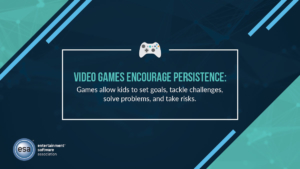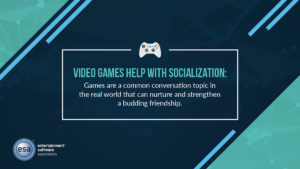The following article was written by ESRB president Patricia Vance and originally appeared in Education and Career News.
Lions and tigers and video games, oh my! It’s no secret that mainstream news media has a knee-jerk tendency to focus on the negative rather than the positive, and it’s no different when it comes to their reporting on video games. As a result, many parents are simply unaware of the variety of potential benefits their child may gain from playing games. Sure, like most forms of entertainment, video games start as fun, but anyone that’s seen the grin spread across a child’s face the first time they overcome a particularly difficult game challenge knows that there’s more to it than just fun.

Video Games Encourage Persistence
It’s important for parents to first understand why children love video games. Young gamers often cite the sense of freedom and self-dedication as key draws for them to play. It might be hard to see through their twitching fingers, but games allow kids to set goals, tackle challenges, solve problems, and take risks. This teaches children how to fail, try again, and overcome obstacles without the fear they may feel in the real world.
Video Games Increase Physical Activity
Many gamers are also inspired by their favorite games to become more active in their every-day lives, not less. A Harvard study found that kids who played sports games were frequently motivated to take up athletics in real life, or train to develop more competitive techniques for activities in which they were already interested. As Pokémon GO proved, a free mobile game can kick off a population-wide increase in physical activity as fans of all ages search for elusive Pokémon.

Video Games Help with Socialization
Games can also encourage positive social behavior. Being a popular activity among your child’s peers, games are a common conversation topic in the real world that can nurture and strengthen a budding friendship. Whether talking strategies at recess or executing them together, kids can also develop their teamwork, collaboration, and leadership skills while enjoying friendly competition with their pals… or even parents.
While the benefits of playing in responsible doses should ease many parents’ concerns, it’s probably not a good idea for your child to sit in front of a game console for hours on end, assuming it will get them into an Ivy League university. Parents should not only monitor playtime — balancing it with school responsibilities, physical activity, and social obligations — but carefully consider whether the games they’re playing are age-appropriate.
Bottom line, enjoying the right games under the right circumstances can be fun, while also being good for you and your family.



